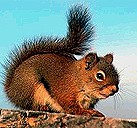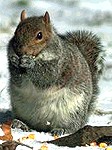|
October 9, 2000  The brisk air and changing color of leaves tell you that winter is on its
way. Although we humans go about our business as usual during the winter,
some animals engage in a special kind of sleep called hibernation.
Hibernation helps animals survive the cold winter when it is difficult for
them to find food. The body temperature of some animals drops to near
freezing as they prepare to hibernate when heart rate and other body
functions slow. Although body temperature gets quite low, these
hibernating animals wake up and warm up in the spring without any damage.
New research provides some clues about how their brains survive such
cold temperatures.
The brisk air and changing color of leaves tell you that winter is on its
way. Although we humans go about our business as usual during the winter,
some animals engage in a special kind of sleep called hibernation.
Hibernation helps animals survive the cold winter when it is difficult for
them to find food. The body temperature of some animals drops to near
freezing as they prepare to hibernate when heart rate and other body
functions slow. Although body temperature gets quite low, these
hibernating animals wake up and warm up in the spring without any damage.
New research provides some clues about how their brains survive such
cold temperatures.  Scientists at the National Institutes of
Health (NIH) examined the brains of ground squirrels at different
stages of hibernation. Using light and electron microscopes, the
researchers saw "slits" inside neurons and glial cells of hibernating
ground squirrels. These slits were never seen in tissue from
non-hibernating animals. The slits appeared to be hardened patches on the
endoplasmic reticulum without any protein. The
endoplasmic reticulum is a structure in the cell that is responsible for
producing proteins, lipids and other materials for cell metabolism.
Scientists at the National Institutes of
Health (NIH) examined the brains of ground squirrels at different
stages of hibernation. Using light and electron microscopes, the
researchers saw "slits" inside neurons and glial cells of hibernating
ground squirrels. These slits were never seen in tissue from
non-hibernating animals. The slits appeared to be hardened patches on the
endoplasmic reticulum without any protein. The
endoplasmic reticulum is a structure in the cell that is responsible for
producing proteins, lipids and other materials for cell metabolism.
 The NIH scientists believe that the lipids and proteins that make up the
membrane of the endoplasmic reticulum were rearranged during hibernation
to form areas with and without proteins. Because the proteins moved to
areas that were not hardened, it is possible that they continued to
function and keep the cells alive.
The NIH scientists believe that the lipids and proteins that make up the
membrane of the endoplasmic reticulum were rearranged during hibernation
to form areas with and without proteins. Because the proteins moved to
areas that were not hardened, it is possible that they continued to
function and keep the cells alive.
Exactly how the proteins and lipids became rearranged is not known.
Further studies may provide a better understanding of the changes that
occur during hibernation and may uncover ways to preserve and protect
tissue from cold temperatures.
| 

![[email]](./gif/menue.gif)



